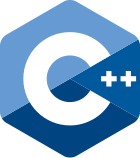







































This file implements part of a complex number class. Its chief educational purpose is to teach operator overloading. We want to implement: pre-increment post-increment bool + += == != Further overloads can be left for the student.
#include <iostream>
#include <iomanip>
#include <vector>
using namespace std;
const bool DEBUG = true;
class Complex {
friend ostream& operator<< (ostream& os, const Complex& c);
friend istream& operator>> (istream& is, Complex& c);
friend Complex operator+ (const Complex& c1,
const Complex& c2) {
Complex sum(c1.real + c2.real, c1.imag + c2.imag);
return sum;
}
friend bool operator==(const Complex& rhs, const Complex& lhs) {
return ((rhs.real == lhs.real) && (rhs.imag == lhs.imag));
}
public:
Our sole constructor takes defaults of 0 for both real and imag, so can be called with no arguments.
Complex(double real=0.0, double imag=0.0)
: real{real}, imag{imag} {}
pre-increment:
Complex& operator++() {
++real;
// return ourselves to allow `x = ++y;`
return (*this);
}
post-increment:
Complex operator++(int dummy) {
Complex temp(*this);
real++;
return temp;
}
explicit operator bool() const {
return ((real != 0) || (imag != 0));
}
private:
double real;
double imag;
};
bool operator!=(const Complex& rhs, const Complex& lhs) {
return ! (rhs == lhs);
}
ostream& operator<< (ostream& os, const Complex& c) {
Outputting a Complex instance, while illustrating some of the capabilities of I/O streams: setprecision gives us a fixed number of decimal places, while showpos turns on the plus sign for positive numbers.
os << setprecision(10) << c.real << showpos
<< c.imag << "i" << noshowpos;
return os;
}
Read a Complex number from an input stream.
istream& operator>> (istream& is, Complex& c) {
is >> c.real >> c.imag;
return is;
}
void printVector(const vector<Complex>& v);
The code in main just exercizes the Complex class.
int main() {
cout << "Enter a complex number:\n";
Complex c1{10, 10};
// get a complex from stdin:
// but not when testing!
// cin >> c1;
if(!cin)
{
cerr << "Bad input format\n";
exit(1);
}
if(DEBUG)
{
cout << "c1 = " << c1 << endl;
}
Complex c2{43.2, 58.9};
if(DEBUG)
{
cout << "c2 = " << c2 << endl;
}
// see if `Complex` addition works:
Complex c3 = c1 + c2;
cout << "c3 = " << c3 << endl;
// Complex c3;
Complex c4 = Complex();
cout << "c4 = " << c4 << endl;
if (!c4) { cout << "c4 is false\n"; }
// test post-increment:
c4++;
cout << "c4 = " << c4 << endl;
if (c4) { cout << "c4 is true\n"; }
cout << "c4 == c3 ? " << (c4 == c3) << endl;
cout << "c4 == c4 ? " << (c4 == c4) << endl;
cout << "c4 != c3 ? " << (c4 != c3) << endl;
// c4++;
// * Test equality operator. If we take the `explicit` off of
// * `bool()` in class definition, then this will fail as ambiguous:
// * the compiler won't know if we want a `bool` or `Complex` comparison.
if(1 == c4) cout << "c4 == 1 is true\n";
// : cout << "c4 == 1 is false\n";
// // test bool() operator:
// (c4) ? cout << "c4 is true\n" : cout << "c4 is false\n";
The next line of code will implicitly construct a Complex out of 14.2 using the default imaginary component of 0.0.
Complex c5 = 14.2;
vector<Complex> v{c1, c2, c3, c4, c5};
// cout << "Printing vector\n";
// printVector(v);
}
Print a vector of type Complex: templates haven't been taught yet!
void printVector(const vector<Complex>& v)
{
auto detects the type coming out of the vector automatically:
for(auto c : v) {
cout << c;
}
}